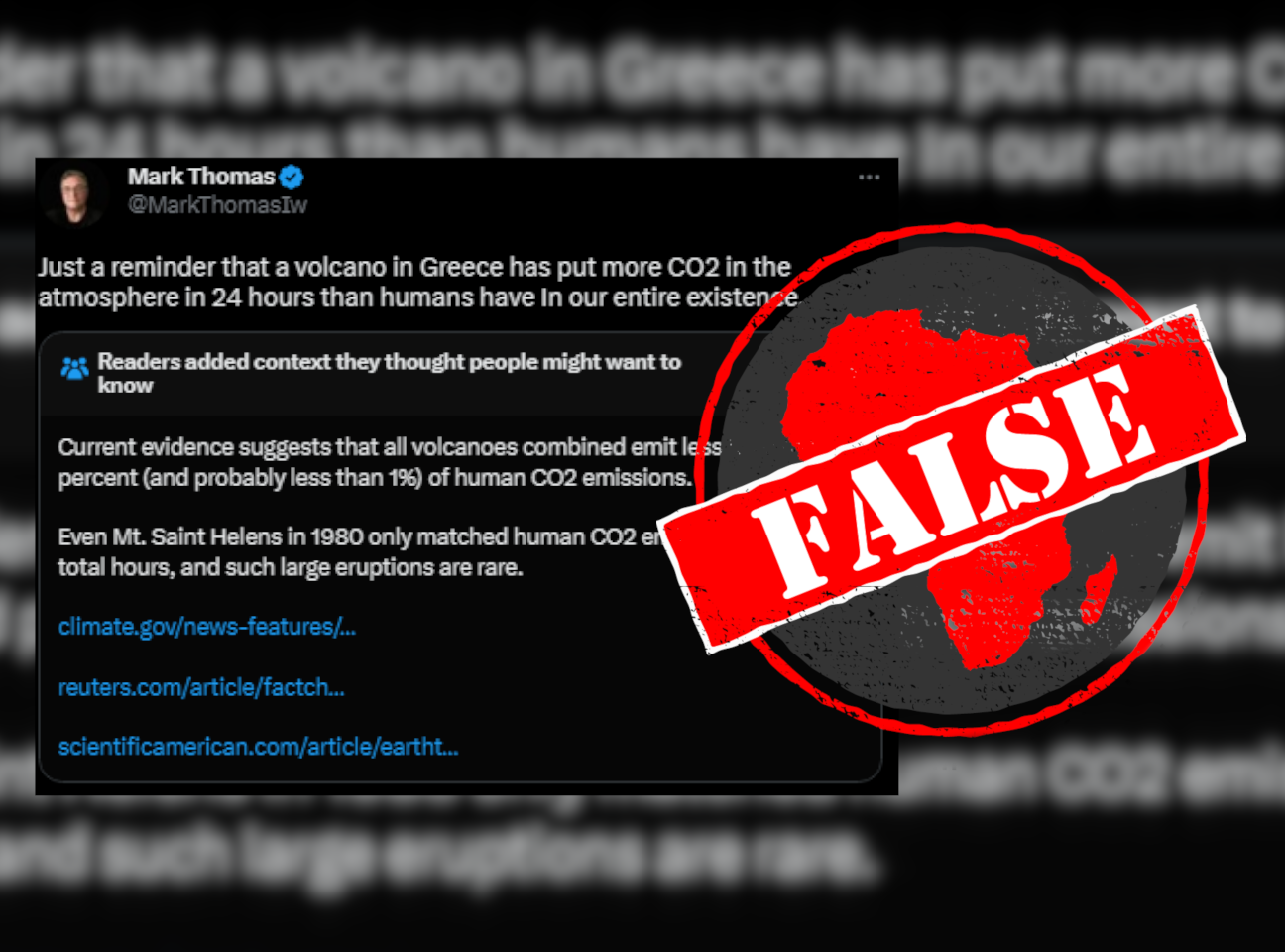IN SHORT: Posts on social media, perhaps as an attempted “gotcha” to those worried about climate change, claim an erupting volcano can put more carbon dioxide into Earth’s atmosphere in 24 hours than humans have in all of human existence. But this is false.
A series of social media posts circulating on social media in January 2023 claim that volcanoes – more specifically “a volcano in Greece” – has “put more CO2 in the atmosphere in 24 hours than humans have in our entire existence”.
The claim is popular online. One version of it has been viewed 3.4 million times and received more than 80,000 likes on Twitter. Other posts making the same claim appeared here and on Facebook here. One post ended sarcastically: “WE NEED ELECTRIC VOLCANOES.”
As Reuters reported, the same claim has been circulated on social media since at least 2016, like here and here. But is there any truth to the idea that a volcano has emitted more carbon dioxide than humans have? We checked.

Climate change, natural phenomena and human activities
Climate change refers to shifts over long periods of time in the world’s patterns of weather and temperature. It is important to note that climate is not the same as weather.
Climate change has occurred naturally for as long as Earth has existed, because of phenomena like the solar cycle. But scientists have learned that since the 1800s human activities have been the main cause of climate change. This is largely because of industrialisation, which led to the large-scale burning of fossil fuels to get the energy needed to power industry.
Burning oil, gas, coal and other fossil fuels creates greenhouse gases, such as carbon dioxide (CO2) and methane. The United Nations describes it like this: when these gases are released into the atmosphere, they “act like a blanket wrapped around the Earth”, which traps heat and causes temperatures to rise.
Since pre-industrial times, the global average temperature has increased 1.1 degrees celsius. This may not sound like a lot, but just this small change has huge consequences for all life on the planet.
If climate change continues on its current path, it will have devastating effects. These include increases in extreme weather events like droughts and floods, as well as food and water shortages, deforestation, and large-scale extinction of plants and animals. This is not confined to the future – some of these effects can already be seen today.
Volcanoes and carbon dioxide emissions
One of the natural forces that emits carbon dioxide is volcanoes. According to the US Geological Survey (USGS), when volcanoes erupt, they release huge quantities of gas, ash and aerosol droplets into the atmosphere. While ash will fall and be removed in days or weeks, gases have a longer-lasting impact. Some of these, such as sulphur dioxide, can cause global cooling, and others, like carbon dioxide, can potentially “promote global warming”.
Some scientists believe it is possible that volcanoes contributed significantly to global warming in the distant past, before humans existed. But this is still an area of debate among researchers.
Human activities release far more CO2 than volcanic eruptions
Scientists have created ways to estimate the amount of carbon dioxide that is released into the atmosphere, and see which sources it comes from. According to the USGS, the combined emissions from all volcanoes, both on land and under water, lie in the range of 0.13 to 0.44 gigatonnes every year.
On the other hand, carbon dioxide emissions from human activities, such as burning fuel and industry, reached 36.3 gigatonnes, the highest ever level, in the latest data from 2021. This is according to the Global Energy Review.
It is accepted by the scientific community that the contribution volcanoes make to global warming is very, very minor – a small fraction of the emissions from human activities. (See a visual representation below, for a comparison over time.)
According to the Intergovernmental Panel on Climate Change (IPCC), which examines climate change research around the world, carbon dioxide emissions from volcanic eruptions are well-understood by scientists. In total, the IPCC says, volcanic emissions are “at least 100 times smaller than anthropogenic emissions”, making them “inconsequential for climate on century time scales”.
So although volcanoes may cause short-term changes to the earth’s climate, these are insignificant and far smaller than those of human-caused emissions.
Source: Climate.gov
Republish our content for free
For publishers: what to do if your post is rated false
A fact-checker has rated your Facebook or Instagram post as “false”, “altered”, “partly false” or “missing context”. This could have serious consequences. What do you do?
Click on our guide for the steps you should follow.
Publishers guideAfrica Check teams up with Facebook
Africa Check is a partner in Meta's third-party fact-checking programme to help stop the spread of false information on social media.
The content we rate as “false” will be downgraded on Facebook and Instagram. This means fewer people will see it.
You can also help identify false information on Facebook. This guide explains how.


Add new comment